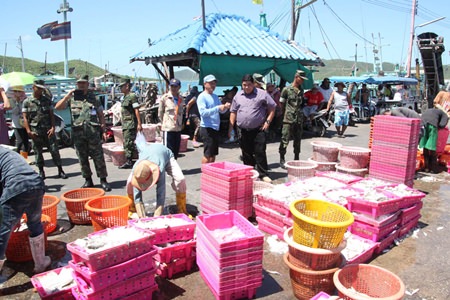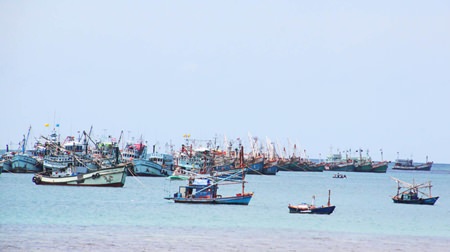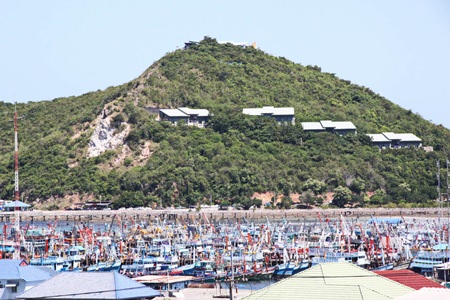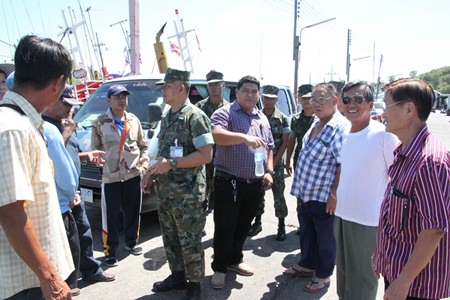Dozens of boats sit idle in Sattahip, showing solidarity to hundreds of others across the Eastern Seaboard who either didn’t or couldn’t meet the June 30 deadline to comply with so-called “illegal, unreported and unregistered” fishing rules to prevent Thailand’s seafood exports from being banned in Europe.
Claims of shortages, higher prices as yet unproven
Hundreds of fishing boats across the Eastern Seaboard remain in port after strict new rules went into effect to prevent Thailand’s seafood exports from being banned in Europe.
From Samae San to Naklua, fishermen sit idle who didn’t or couldn’t meet the June 30 deadline to comply with so-called “illegal, unreported and unregistered” fishing rules. Fishing groups claimed that the idling of the boats already is resulting in shortages and higher prices for seafood, but surveys nationwide say otherwise.
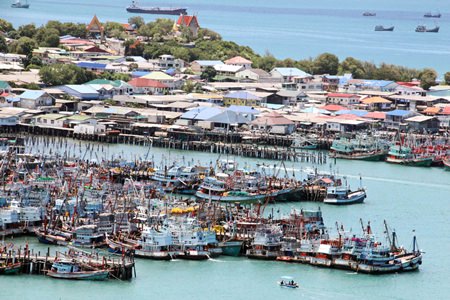 Dozens of boats sit idle in Sattahip, showing solidarity to hundreds of others across the Eastern Seaboard who either didn’t or couldn’t meet the June 30 deadline to comply with so-called “illegal, unreported and unregistered” fishing rules to prevent Thailand’s seafood exports from being banned in Europe.
Dozens of boats sit idle in Sattahip, showing solidarity to hundreds of others across the Eastern Seaboard who either didn’t or couldn’t meet the June 30 deadline to comply with so-called “illegal, unreported and unregistered” fishing rules to prevent Thailand’s seafood exports from being banned in Europe.
In Sattahip, about 300 boats have been idled at the large Samae San fishing port while fewer than 100 have refused to go to sea from ports in Naklua, Banglamung and Koh Larn. Nationally, the government says about 25 percent of all fishing boats are refusing to put to sea.
Boat operators said they would rather stay in port than take the risk of getting hit with large fines and possible jail time for being caught not complying with the IUU regulations.
The rules require that boats be properly registered, have legal fishing licenses, have fishing gear matching the type they had at time of registration, and have required monitoring equipment, such as a Vessel Monitoring System.
But, at this point, only vessels of 30 gross tons fall under the regulations, of which there are only three registered in the Pattaya area. Other boats choosing to remain in port are doing so in protest, showing solidarity with colleagues in hopes of pressuring the government to grant yet another reprieve from the regulations.
That appears extremely unlikely to happen. Port checks began July 1 in Sattahip with district security chief Chawat Theptup leading soldiers from the 14th Military Circle to the Ban Chong pier to check for compliance.
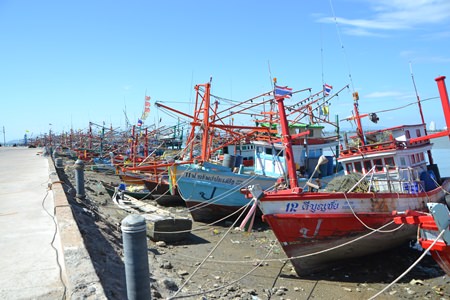 Fishing boats in Naklua remained beached in protest of strict new regulations, with captains saying they’d rather stay in port than take the risk of getting hit with large fines and possible jail time for being caught not complying with the IUU regulations.
Fishing boats in Naklua remained beached in protest of strict new regulations, with captains saying they’d rather stay in port than take the risk of getting hit with large fines and possible jail time for being caught not complying with the IUU regulations.
Government officials, all the way up to Prime Minister Prayut Chan-o-cha, have said they will not grant fishermen any more time. The premier said in a testy session with reporters that the industry already was given 90 days to comply, which he considered plenty of time to meet the law’s requirements.
The 30 billion baht the country would lose a year from a ban on European Union seafood imports far outweighs the impact to individual fishermen or the impact on the Thai economy of a small percentage of boats laying up, Prayut said.
Nonetheless, Pramote “Sia Lek” Thoasakul, a former Samae San village headman and now a leading fishing operator, said the Samae San Fishing Association wants the government to grant operators more time to meet the requirements and has told members to stay moored until it does.
Banglamung District Chief Chakorn Kanjawattana said the district has 499 fishing boats, the vast majority have registered an are in compliance with the law. About 50 boats in at the Naklua Soi 12 pier have been idled and fewer than 50 others remain in port.
Fishermen are claiming that their strike already is leading to higher prices of seafood and shortages in hotels and restaurants, but no details were provided.
Nationally, market vendors have reported no shortfall in supply, canneries and processing plants are working as normal and the government said it expects no problems.
Small fishermen with vessels falling below the 30-ton threshold have even banded together, offering direct sales to consumers in coastal provinces hit by the fishermen strike.
